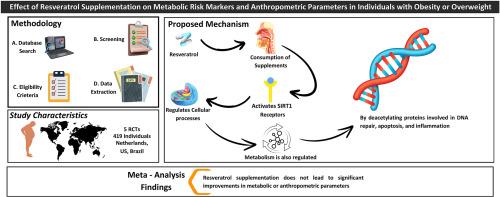Effect of resveratrol supplementation on metabolic risk markers and anthropometric parameters in individuals with obesity or overweight: A systematic review and meta-analysis of randomized controlled trials
引用次数: 0
Abstract
Background
Obesity, a progressively widespread disease with a multifaceted etiology, affects nearly 800 million people worldwide. Recent trials suggest that resveratrol, a polyphenolic compound, can be effective for metabolic risk markers and anthropometric parameters in Individuals with Obesity or Overweight. However, a comprehensive analysis is necessary to consolidate these results.
Objectives
To evaluate the impact of 4-week resveratrol supplementation on metabolic risk markers and anthropometric parameters in individuals with obesity or overweight.
Methods
A comprehensive search was executed across PubMed, Cochrane Library, Scopus, Google Scholar, and clinicaltrials.gov, yielding 43 studies after the omission of 20 duplicates. RevMan 5.4 software was used to statistically analyze randomized controlled studies to gauge the impact of resveratrol on the said outcomes in Individuals with Obesity or Overweight. Quality of bias and potential publication bias were measured using the Cochrane Risk of Bias tool and CMA4 software, respectively. Certainty of the evidence was appraised using GRADEpro software. Data was quantified as the standardized mean difference (SMD) and 95 % confidence intervals (CI).
Results
The meta-analysis included 5 trials with 419 participants, evaluating the effect of intervention. Resveratrol showed no significant impact on triglycerides (SMD = 0.11, 95%CI [-0.14, 0.35], P = 0.39, I2 = 0 %), total cholesterol (SMD = 0.04, 95%CI [-0.26, 0.33], P = 0.82, I2 = 0 %), or HbA1c (SMD = 0.00, 95%CI [-0.99, 1.00], P = 0.99, I2 = 80 %). Similarly, no significant effect was observed for insulin levels (SMD = −0.00, 95%CI [-0.25, 0.24], P = 0.97, I2 = 0 %), AST (SMD = 0.15, 95%CI [-0.35, 0.65], P = 0.55, I2 = 0 %), or ALT (SMD = −0.03, 95%CI [-0.46, 0.39], P = 0.98, I2 = 0 %). Additionally, resveratrol had no significant effect on BMI (MD = 0.21, 95%CI [-0.970, 1.39], P = 0.70, I2 = 0 %).
Conclusions
Our results tagged with p-value>0.05 are an evidence-based indication that resveratrol supplementation does not lead to significant improvements in metabolic or anthropometric parameters. This suggests that resveratrol may not be an effective standalone intervention for managing obesity-related outcomes. Therefore, future research should be redirected to evaluating its potential effects on other health metrics to elucidate its efficacy and therapeutic potential better.

补充白藜芦醇对肥胖或超重人群代谢风险指标和人体测量参数的影响:随机对照试验的系统回顾和荟萃分析
背景肥胖症是一种病因复杂的渐进性疾病,影响着全球近 8 亿人。最近的试验表明,白藜芦醇(一种多酚化合物)对肥胖或超重患者的代谢风险指标和人体测量参数有效。方法在PubMed、Cochrane Library、Scopus、Google Scholar和clinicaltrials.gov上进行了全面检索,在剔除20项重复研究后,共获得43项研究结果。使用 RevMan 5.4 软件对随机对照研究进行统计分析,以评估白藜芦醇对肥胖或超重患者上述结果的影响。使用 Cochrane Risk of Bias 工具和 CMA4 软件分别测量了偏倚质量和潜在的发表偏倚。证据的确定性采用 GRADEpro 软件进行评估。数据量化为标准化均值差异(SMD)和95%置信区间(CI)。白藜芦醇对甘油三酯(SMD = 0.11,95%CI [-0.14,0.35],P = 0.39,I2 = 0%)、总胆固醇(SMD = 0.04,95%CI [-0.26,0.33],P = 0.82,I2 = 0%)或 HbA1c(SMD = 0.00,95%CI [-0.99,1.00],P = 0.99,I2 = 80%)无明显影响。同样,对胰岛素水平(SMD = -0.00,95%CI [-0.25,0.24],P = 0.97,I2 = 0 %)、谷草转氨酶(SMD = 0.15,95%CI [-0.35,0.65],P = 0.55,I2 = 0 %)或谷丙转氨酶(SMD = -0.03,95%CI [-0.46,0.39],P = 0.98,I2 = 0 %)也未观察到明显影响。此外,白藜芦醇对体重指数(MD = 0.21,95%CI [-0.970,1.39],P = 0.70,I2 = 0 %)没有显著影响。这表明,白藜芦醇可能不是管理肥胖相关结果的有效独立干预措施。因此,未来的研究应转向评估白藜芦醇对其他健康指标的潜在影响,以更好地阐明其功效和治疗潜力。
本文章由计算机程序翻译,如有差异,请以英文原文为准。
求助全文
约1分钟内获得全文
求助全文

 求助内容:
求助内容: 应助结果提醒方式:
应助结果提醒方式:


